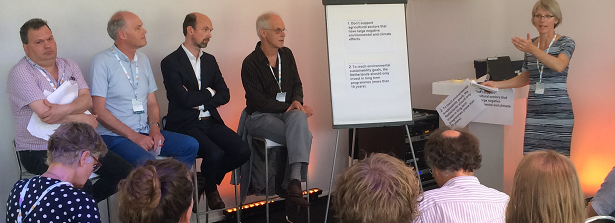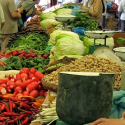Steering towards greater resilience of food production systems and ecosystems

The IOB review found no clear evidence of positive effects of the Dutch food security policy on long-term environmental sustainability. Panellists and participants of the breakout session exploring this challenge supported the IOB’s recommendation to seek solutions for long-term challenges to sustainability. They recommended a holistic, locally embedded and inclusive approach, which aims for improved resilience of both food production systems and the ecosystems they are part of. Future Dutch policy needs to seriously take into consideration this two-sided relationship between food (production) systems and ecosystems and steer towards their mutual reinforcement.
Ken Giller from Wageningen UR introduced the IOB review findings, stating that there is too little attention on environmental impacts in Food and Nutrition Security policy and a lack of continuity in programmes. The discussion that followed started with the proposition that no agricultural sector with sizeable negative environmental and climate effects should be supported by the Dutch government. Panellists and participants agreed that action is needed, yet did not agree that completely stopping such investments is the best solution. Farmers need to have a profitable and culturally acceptable alternative first. Also, Dutch policy should not deny that there is a need to produce enough food for the growing world population. Unsustainable soy, banana or livestock production, for example, are not easily substituted with alternatives. A South-Sudanese livestock farmer for instance, would be reluctant to start growing legumes, as this might include a risk of reduced social status and unclear income consequences. Hans-Willem van der Waal (AgroFair) argued for a more practical approach “working with crop farmers we are familiar with, and improving the sustainability of those farms”.
Enabling environment for sector actors that show willingness
Martin van Ittersum (Wageningen UR) commented that agricultural intensification is needed to provide enough food for a growing African population, but that the Dutch contribution could be to enhance ecological intensification that does not generate negative environmental impact. The panel suggested that in order to realize this, any Dutch policy or investment decision should be based on a holistic analysis of the local context, including an analysis of the expected environmental impact. This could help in assessing whether agrofood investments would have harmful effects on soil, wildlife or climate, for example, and whether and how these effects could be mitigated or prevented. On degraded land in the Sahel for example, livestock is the only profitable way to use the available natural resources. Instead of banning such sectors from support, the panel called for supporting stakeholders in these sectors who are committed to complying with sustainability standards. Rob Glastra (IUCN) contributed that Dutch collaboration with the growth corridors1 in Africa could change towards a focus on optimizing contributions to sustainability and thus limiting harmful effects. Governments have a key role to play in providing an enabling environment for sector actors that show willingness to change, with the appropriate incentives at the national and international levels.
According to Danny Wijnhoud (ActionAid), concentrating on enhancing the sustainability of export commodity chains only would not be the solution. Dutch Food and Nutrition Security interventions need to follow an agro-ecological, bottom-up approach, strengthening local food systems and facilitating multiple local value chains characterized by a combination of food crops and commodities. This would guarantee ownership by local producers (including women), contribute to biodiversity and generate solutions for the sustainable management of natural resources, also where multiple actors or factors compete for water, land and labour.
Panellists and audience members agreed that Dutch policy should invest more in strengthening ecosystems that support food systems. This would imply restoring degraded soil, land, forests and marine systems. Restoration would not necessarily focus on huge swathes of degraded land but could also happen on the mosaics of land use and degraded patches of more productive farms. As such, the services that ecosystems provide can be maintained and restored, and the ecological intensification of agriculture enabled.
Achieving long-term environmental sustainability
The second part of the discussion focused on the timeframe of Dutch Food and Nutrition Security programmes and the proposition that real improvements in sustainability can hardly be made in any programme shorter than ten years. “Of course, all researchers will agree upon this. We feel uncomfortable looking at a three-year time-span graph,” admitted Martin van Ittersum. In the discussion that followed, participants again stressed the importance of ownership by local actors of any programme or agenda. Martin van Ittersum also mentioned that to achieve long-term environmental sustainability, an integrated system approach embedded in the local context is needed. Strategies within the partner countries should be leading, and Dutch policy, projects and investments need to be supportive and possibly catalytic to those. Participants suggested that the changing political leadership in the Netherlands every four years, and its impact on policy and programmes, is a cause of sub-optimal commitment. Yet this does not change the need to align with long-term ambitions of the partner countries or regions.
Discussants added that Dutch government programmes do not always have to be long-term. Timeframes may be differentiated depending on the type of programme, the roles of national governments and other international donors, and based on the (financial) needs of the local context. To allow for a catalytic effect of projects, it may be smart to start with a short intervention that creates incentives for bottom-up support and participation and from there develop a longer-term plan. Short-term Dutch-funded projects that are embedded in a longer-term locally owned programme may sometimes be more effective, depending on the environmental problem and social context.
Conclusions
The session overall resulted in agreement on the need to shift to a positive agenda for sustainable agriculture as part of Dutch Food and Nutrition Security policy, also noting that the Sustainable Development Goals on zero hunger and protection of life on land (SDG 2 and SDG 15) are closely connected. The two-sided relationship between agri-food and ecosystems justifies that investments should be monitored for positive and mutually reinforcing impacts on both. This agenda needs to be supported through a more systemic forecasting and monitoring of environmental and climate impacts of policy and investments.
Breakout session 4: environmental sustainability of food systems (and inclusiveness)
Facilitator: Nicole Metz (Food & Business Knowledge Platform)
Panellists
- Martin van Ittersum (Wageningen UR)
- Danny Wijnhoud (ActionAid)
- Rob Glastra (International Union for Conservation of Nature, IUCN)
- Hans-Willem van der Waal (AgroFair)
Footnotes
- 1. Growth corridors are areas of intensive economic growth, where the development of natural-resource based industries- such as agriculture and mining – have been prioritized by national African governments because of their potential to catalyse rapid economic growth.






